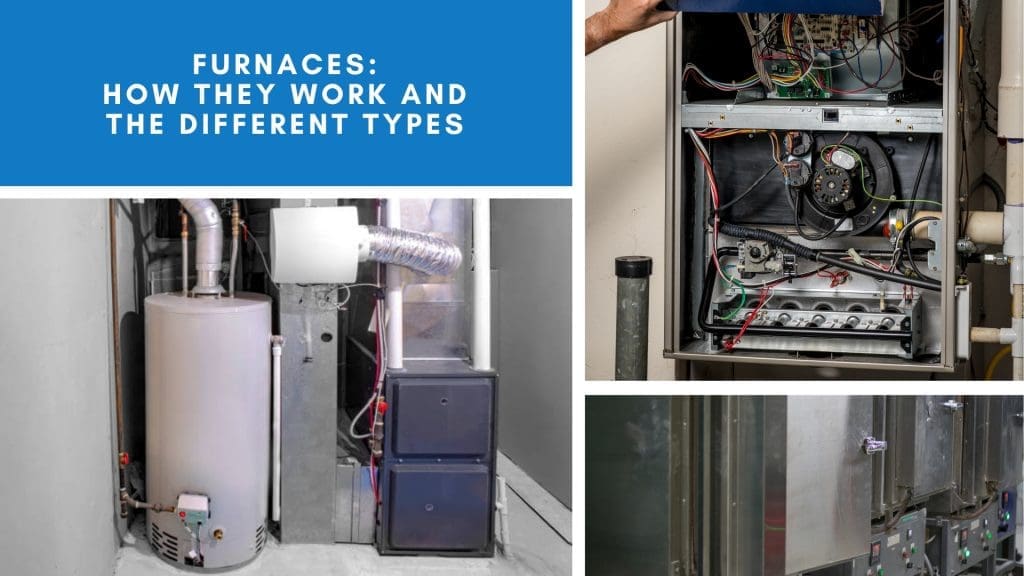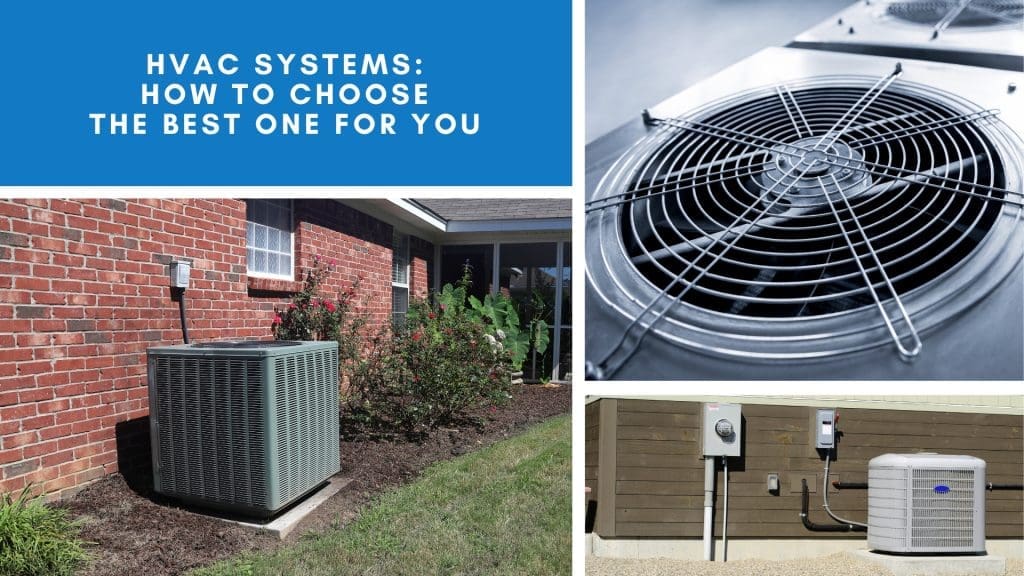When it comes to maintaining a comfortable and healthy indoor environment, the quality of the air we breathe is paramount. This is especially true for those of us who spend a significant amount of time indoors, whether we’re running a small business, working from home, or managing a busy household.
One of the most effective ways to improve indoor air quality is by using a High-Efficiency Particulate Air (HEPA) filter in your air conditioning (AC) system. These filters are designed to capture a wide range of airborne particles, including dust, pollen, and even microscopic bacteria and viruses.
But what exactly is a HEPA filter, and how does it work? More importantly, what are the benefits of using a HEPA filter in your AC system, and how can it contribute to a healthier, more comfortable indoor environment?
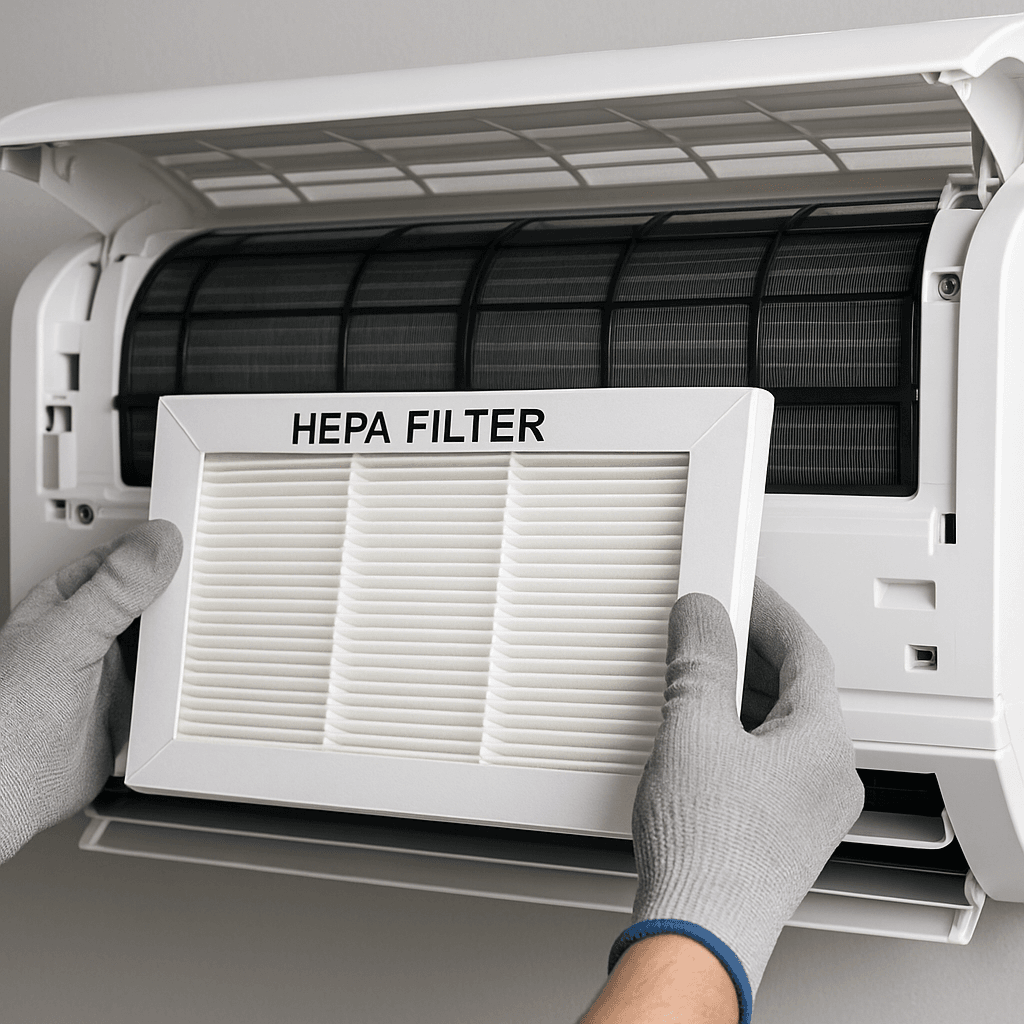
In this comprehensive guide, we’ll delve into these questions and more, providing you with the information you need to make an informed decision about your indoor air quality solutions. Whether you’re a seasoned HVAC professional or a homeowner looking to improve your indoor air, this guide is for you.
So, let’s get started and explore the benefits of using HEPA filters in AC systems.
Understanding HEPA Filters and Their Efficiency
HEPA filters have become a staple in enhancing indoor air quality. But to harness their full potential, it’s crucial to understand how they work.
These filters are designed to trap particles, ensuring that the air circulating in your space is cleaner and healthier. The technology behind them is both simple and effective.
The efficiency of a HEPA filter is largely due to its ability to capture particles of various sizes. From the smallest bacteria to larger dust and pollen, HEPA filters can catch them all.
Key features of HEPA filters include:
- Particle Trapping: Captures 99.97% of particles that are 0.3 microns.
- Versatility: Can be used in different AC systems.
- Comprehensive Filtration: Reduces allergens, dust, and pollutants.
By incorporating a HEPA filter into your AC system, you optimize both air quality and system performance.
What Does HEPA Stand For?
HEPA stands for High-Efficiency Particulate Air. This designation signifies a high standard of air filtration efficiency.
These filters were first developed during World War II to remove radioactive particles. Since then, they’ve become essential in various industries.
In modern times, they’ve been adapted for use in homes, hospitals, and factories. HEPA technology ensures that your indoor environment is healthier, providing peace of mind for everyone.
The Science Behind 99.97% Filtration
At the heart of a HEPA filter’s efficiency is its ability to trap 99.97% of airborne particles measuring 0.3 microns. This remarkable capability differentiates HEPA filters from other filters on the market.
The fibers in a HEPA filter are arranged randomly, capturing particles via diffusion, interception, and impaction. This complex mechanism is what ensures high filtration efficiency.
The 0.3-micron specification is often referred to as the “most penetrating particle size” (MPPS). At this size, particles are most challenging to filter, thus demonstrating the HEPA filter’s effectiveness.
This efficiency is why HEPA filters are trusted in environments where air quality is critical. Whether it’s protecting against allergens or ensuring a virus-free environment, HEPA technology is unmatched.
Choosing HEPA filtration means choosing cleaner, healthier air for your home or workplace.
The Health Benefits of HEPA Filters in AC Systems
HEPA filters are not just about cleaner air; they’re about healthier living. When you install a HEPA filter, you’re investing in well-being. These filters are particularly effective for those sensitive to airborne irritants.
By capturing a wide array of allergens and pollutants, HEPA filters create a cleaner environment. The reduction in harmful particles means fewer allergic reactions and respiratory issues.
Consider the typical pollutants present indoors. HEPA filters are designed to capture:
- Pollen and pet dander
- Mold spores and dust mites
- Tobacco smoke and household dust

The impact of using HEPA filters extends beyond those with allergies or asthma. Everyone can benefit from improved air quality. Cleaner air translates to less dust on surfaces and a fresher-smelling home. This can lead to reduced cleaning time and increased indoor comfort.
Allergies and Asthma: Breathing Easier with HEPA
For allergy sufferers, HEPA filters can be a game-changer. They effectively capture allergens like pollen and pet dander. This can make a significant difference during allergy seasons.
Asthma patients also benefit from the reduced irritants in the air. Less exposure to triggers can mean fewer asthma attacks. This improvement leads to more comfortable, easy breathing at home.
Utilizing HEPA filters can also mean better sleep for those affected by allergies. With fewer irritants in the air, night-time coughing and sneezing are minimized. This restful environment can significantly enhance one’s quality of life.
Combatting Viruses and Improving Indoor Air Quality
HEPA filters are also effective in reducing the spread of viruses. The ability to trap these tiny particles contributes to a healthier indoor environment.
During flu season, or in times of viral outbreaks, HEPA filters can provide added peace of mind. Their use ensures that many harmful particles are captured before they circulate indoors.
The presence of HEPA filters in homes means improved air quality for everyone. Cleaner air reduces the risk of respiratory infections. It also creates a safer space for vulnerable family members, like children and the elderly.
In conclusion, HEPA filters stand as a strong defense against viruses and pollutants. Their role in maintaining a healthy home environment is hard to overestimate.
Types of HEPA Filters and Their Applications
HEPA filters are versatile and can be adapted to various AC systems. Choosing the right type of HEPA filter ensures effective air purification. Understanding different applications helps in making an informed decision.
HEPA filters can be integrated into different types of air conditioning systems. Their adaptability is one of their strengths. Here’s how they’re commonly used:
- Ducted Systems: Ideal for central air conditioning systems.
- Portable AC Units: Great for localized air purification.
- Window AC Units: Suitable for single-room applications.
- Split AC Systems: Offers flexibility for multi-room setups.
Each type of HEPA filter has its own set of benefits. Portable and window unit filters are easy to replace and maintain. Meanwhile, central system filters often require professional installation.
Selecting the right HEPA filter involves assessing your specific needs. Consider the size of the area and the type of pollutants present. This ensures you gain maximum air purification benefits.
From Portable AC Units to Central Systems: Finding Your Fit
The HVAC world offers HEPA filters that fit a variety of AC systems. Whether you’re dealing with a small room or a whole house, there’s a HEPA filter for your needs. You must pick a filter tailored to your specific AC setup.
Portable AC units benefit from HEPA filters designed for quick replacements. They’re handy and suitable for temporary settings like rented spaces. These are effective in reducing allergens in a targeted area.
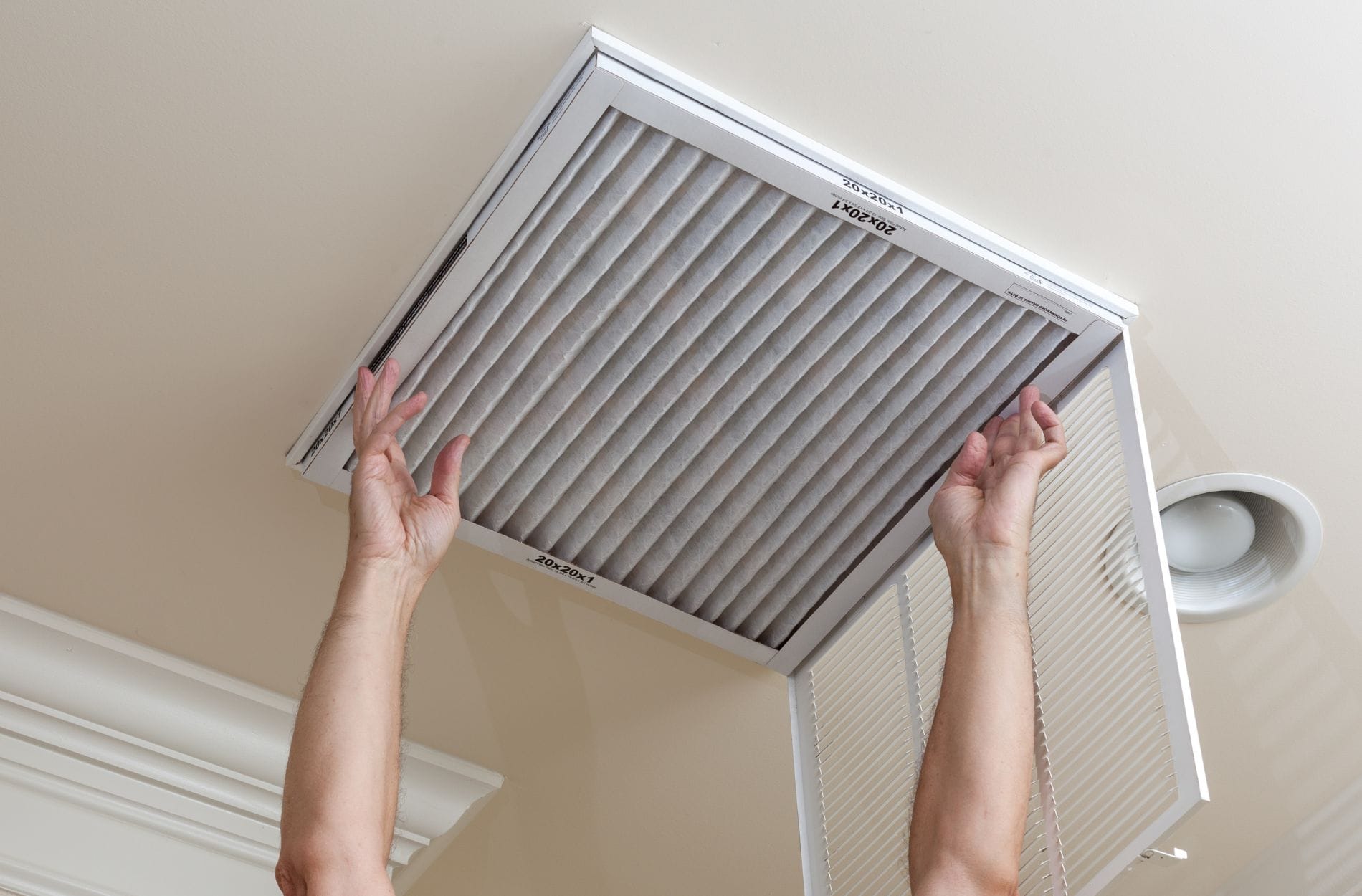
For split AC systems, HEPA filters come as sheets or cartridges. They provide extensive coverage and flexible installation options. This is ideal for homeowners looking to minimize allergens throughout their homes.
Central AC systems benefit from duct-based HEPA filters. These provide a comprehensive solution for larger homes. They help maintain consistent air purity throughout the structure.
HEPA Grades and MERV Ratings Explained
HEPA filters come in different grades, such as H13 and H14. These grades indicate the efficiency of the filter. Higher numbers generally mean a higher percentage of particle capture.
MERV ratings, on the other hand, measure the effectiveness of air filters. The higher the MERV rating, the more efficient the filter. For HEPA filters, MERV ratings often exceed those of standard AC filters.
Understanding these metrics helps you make a more informed choice. H13 filters capture a significant amount of microparticles, making them suitable for most homes. H14 filters can be excellent for settings where cleanliness is critical.
By combining HEPA grades with MERV ratings, you can select a filter that best fits your needs. Whether you aim for high efficiency or balance with air flow, knowing these ratings helps. This ensures your investment aligns with your air quality goals.
Cost and Maintenance: What to Expect with HEPA Filters
Investing in a HEPA filter involves both initial and ongoing costs. It’s important to understand these to fully appreciate their value. While the upfront price may be higher, the long-term benefits often outweigh the costs.
The purchase of a HEPA filter is an investment in your health. Unlike standard filters, HEPA filters offer superior air filtration. This can reduce household cleaning costs due to minimized dust buildup.
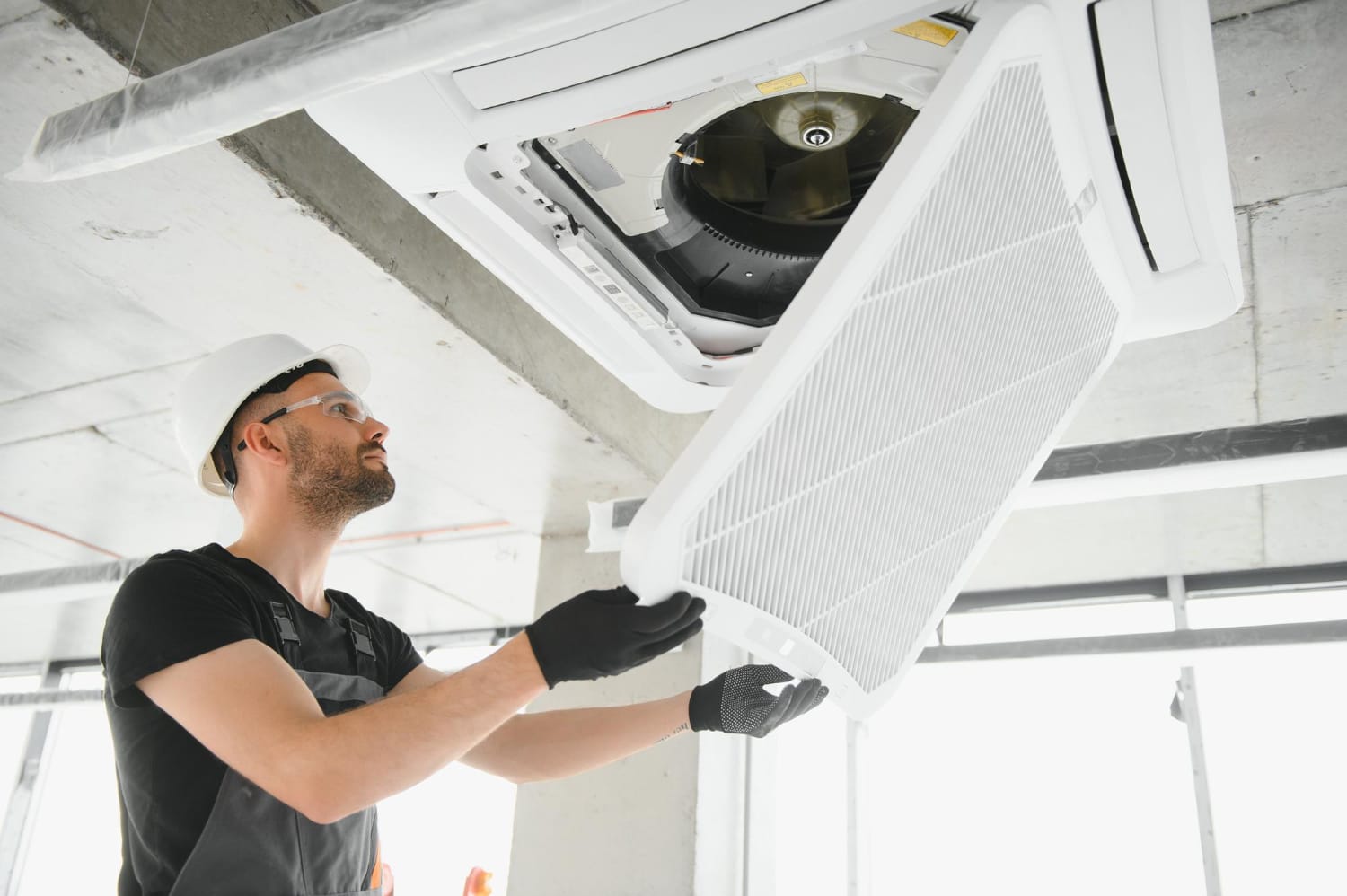
Maintenance costs are another consideration. Regular replacement or cleaning ensures the filter’s efficiency. Here’s a simple breakdown of what to expect:
- Initial Purchase: Higher cost than regular filters.
- Energy Use: Slightly increased due to airflow resistance.
- Replacement or Cleaning: Required periodically to maintain performance.
It’s wise to plan for these costs as they ensure continued air quality improvement. Some reusable HEPA filters can lower long-term expenses. Consider your specific requirements when choosing a filter.
Balancing Initial Investment and Long-Term Benefits
The initial cost of HEPA filters can be a deterrent. However, think of it as an investment in your environment’s health. Clean air often leads to better productivity and fewer doctor visits.
Over time, the benefits become clear. Enhanced air quality can improve well-being and reduce allergy symptoms. These long-term advantages often overshadow the initial outlay.
HEPA filters also contribute to less frequent cleaning needs. They efficiently capture dust and allergens, leading to cleaner surfaces. Thus, they save both time and effort in home maintenance.
Tips for Maintaining Your HEPA Filter
Proper maintenance prolongs the life of your HEPA filter. It ensures the filter continues to provide high-quality air purification. Follow these simple tips for optimal performance.
Firstly, check your filter regularly for dust and dirt buildup. Signs of wear mean it’s time for cleaning or replacement. Keeping a schedule helps to avoid lapses in efficiency.
Some HEPA filters are reusable and need proper washing. Follow manufacturer instructions to clean them correctly. Incorrect cleaning may damage the filter and reduce effectiveness.
Lastly, consider professional servicing if you’re unsure. This ensures your filter remains in top condition. Regular maintenance keeps your environment healthy and your system running smoothly.
Making the Right Choice: HEPA Filters for Your AC
Choosing the right HEPA filter is essential for effective air conditioning. It begins with understanding your AC system’s needs. Correct filter dimensions and grade ensure the best performance.
There’s a variety of HEPA filters suitable for different setups. Consider these factors when making your selection:
- Type of AC System: Portable, central, or split AC.
- Filter Grade: H13 or H14 for varying efficiency.
- MERV Rating: Higher ratings capture smaller particles.
Compatibility with your unit is crucial for optimal function. A filter too large or small can compromise airflow. It’s always a smart idea to consult your AC’s manual or a professional.
Thinking through these choices will enhance your air quality. Not only will you breathe easier, but your system will operate more efficiently. It’s a win-win for both health and comfort.
Professional Installation and Services
Having your HEPA filter professionally installed can make a big difference. Experts ensure a proper fit, optimizing efficiency and longevity. They also verify that everything aligns with your system’s specifications.
A professional touch offers peace of mind. This service eliminates the guesswork and potential mishaps from a DIY approach. Technicians check for air leaks and ensure the filter is secure.
Consider scheduling regular maintenance services. Professionals not only install but also help maintain your HEPA filter. This keeps your AC running smoothly and your air quality at its best.
Where to Buy: Suppliers and Online Retailers
Finding the right place to buy your HEPA filter is important. Both local suppliers and online retailers offer a wide range. Consider convenience, price, and availability when making your purchase.
Local suppliers often provide immediate availability and personalized service. They can offer advice tailored to your specific system. Plus, establishing a local relationship can lead to future support.
Online retailers like Amazon give you access to various brands and models. You can compare prices and read customer reviews for added insight. This flexibility lets you choose the perfect filter for your needs.
Conclusion: The Clear Advantages of HEPA Filters – Benefits of Using HEPA Filters in AC
Incorporating a HEPA filter into your AC system offers undeniable benefits. These filters significantly boost indoor air quality. They efficiently trap allergens, pollutants, and even viruses.
HEPA filters are particularly beneficial for families and allergy sufferers. They provide a cleaner, healthier living space. The improved air quality can also enhance focus and comfort, vital for those working from home.
Ultimately, investing in a HEPA filter means prioritizing your well-being. You’ll experience the advantages through reduced allergens and fresher indoor air. It’s a small step towards a healthier home environment and peace of mind.

